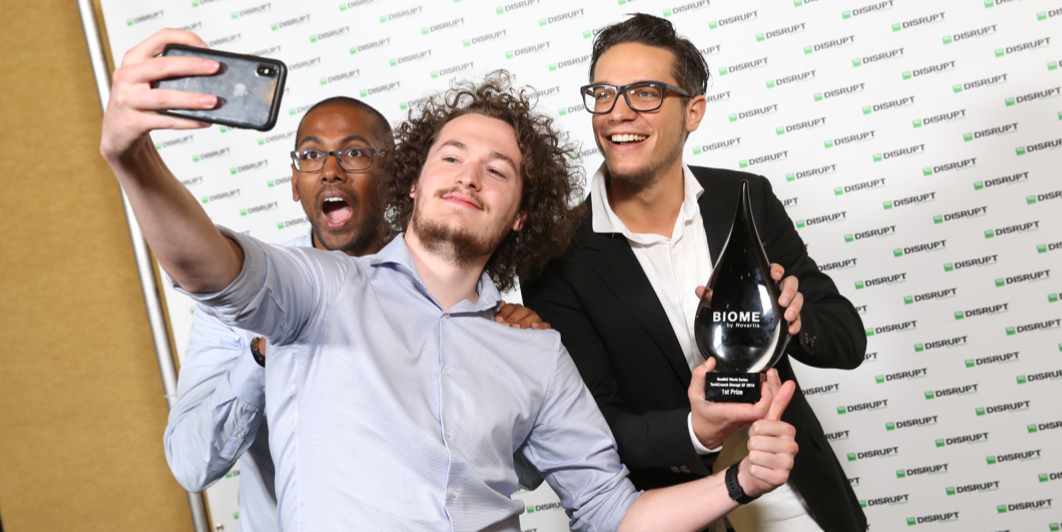Daryl Autar, CEO and Steve Thijssen, CTO at Wavy both share a passion for healthcare hackathons and launched their own MedTech app, Wavy, after winning the TechCrunch Disrupt HealthX World Series in San Francisco.
It all started when Daryl and Steve recognized that there was a large gap in treatment for patients suffering from cardiovascular disease such as Angina Pectoris. The main issue is that current treatment doesn’t provide support in lowering stress and retraining the brain, which is much needed for CVD patients who suffer from physical and mental stress on a regular basis. And that’s where Wavy comes in!
Wavy is a medical app that monitors and lowers CVD patients’ stress to relieve their symptoms. The app provides different relaxation exercises and music therapy to assist in stress reduction. Read the full interview to find out more about healthcare hackathons, innovation in healthcare, Wavy and their journey from idea to startup.
Interview with Steve Thijssen | Blog post by Alexandra Verzuh | Hacking Health Berlin
***
What exactly is Wavy and what’s the story behind it?
Wavy is a medical app which focuses on cardiovascular disease (CVD) patients, with an emphasis on Angina Pectoris and the subgroup Ischemia with non-obstructive coronary arteries (INOCA). Angina Pectoris is a medical condition where physical and mental stress have a large impact on their life. It affects over three million people in Germany and ten million people in the United States. The problem is that treatment and therapy is based on physical fitness, and there was no evidence-based treatment available to retrain behavior and lower stress.
Wavy is a deep tech medical device app that monitors and lowers CVD patients’ stress to relieve their symptoms. The app combines quantitative data from smart wearables, with qualitative data from smart voice assistants, to form a personalized health profile for every individual heart patient. The app provides different relaxation exercises in combination with personal music therapy to lower stress.
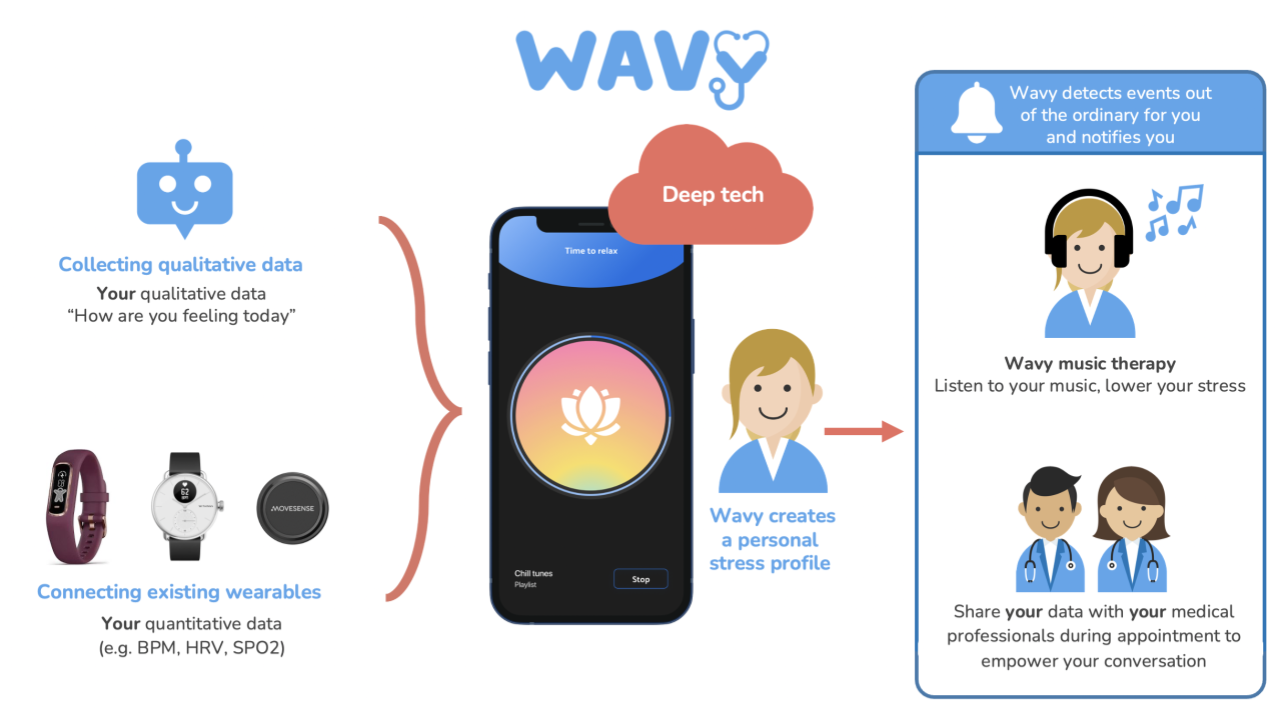
Our company started after winning the TechCrunch Disrupt HealthX World Series by Novartis in San Francisco. Daryl Autar, CEO at Wavy and Steve Thijssen, CTO at Wavy both share a passion for hackathons and met while working at the innovation department of a large bank in the Netherlands. Our passion for hackathons led us to the Vivatech Hackathon in Paris, where we made a solution for sign language with IBM software. It was an amazing experience and we were proud to win the IBM prize.
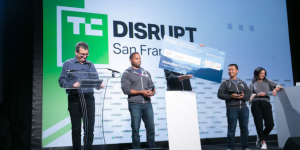
When we were back in the Netherlands, we decided that it would be a great challenge to compete at the TechCrunch Disrupt Hackathon in San Francisco. We found a very interesting challenge from Novartis, which was to help people with heart failure using consumer technology. When we saw the challenge, we immediately started brainstorming possibilities. Only the five best solutions would receive a ticket to San Francisco to present their solution at the Novartis stage.
After weeks of working extremely hard on Wavy, we received an invite saying, “You are one of the five best solutions!” We arrived a few days earlier in our Airbnb in San Mateo, and during this time, we worked many hours into the night. But it was all worth it, because on the big day, we received a lot of positive feedback and won first prize at the TechCrunch Disrupt HealthX World Series by Novartis. This was when our company Wavy was born!
I hear you’ve been hackathon-hopping and have won multiple hackathons. Can you expand on this for us? Eg. What hackathons have you attended and won? How did they help you to further develop your product? How were they different/unique from each other? What do you think the real benefits of attending these hackathons have been for you as founders?
We love hackathons and it’s our passion to create solutions for big problems in this world! We’ve won over 40 hackathons worldwide over the past decade and each one has helped us improve our product, been great for growing our network and a good opportunity to share ideas and inspiration.
In 2020, we won the following hackathons: Dutch Hacking Health Hackathon, reSTART HEALTHcare Hackathon, Global Hack 5G Hackathon and Odyssey Momentum Hackathon for the Future of Acute Healthcare track, one of the biggest hackathons in the world.
Prior to 2020, we won hackathons like: HLTH Hackathon in Las Vegas, Hackathon “Regie op Gegevens”, Blockchaingers Hackathon pension track, Hackathon in Los Angeles, London Angelhack: Best concept with Recowork (Description: Hackcellerator, where Recowork was selected as the best 15 products from more than 800 teams worldwide. Recowork was presented at the Global Demo Day in Silicon Valley), Brains Awards Best Social Innovation, Living Data City Challenge, Capgemini’s Innovator Race and many more. We even competed as the only Dutch team in the invitational Y Combinator Spring Hackathon!
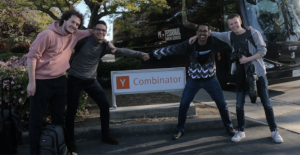
We like healthcare hackathons because they focus directly on helping people’s lives and have a great atmosphere with amazing participants. The difficult part is to continue the project after the hackathon. Entrepreneurship requires a lot of energy and risk-taking. That’s also the reason why many great ideas aren’t continued after hackathons, when people go back to their day jobs. We decided to be different and quit our jobs to focus on Wavy.
It’s always great to work 48-72 hours on a solution with a talented team and work extremely hard to make something that can improve people’s lives.
Please tell us about the main highlights of your journey since the first hackathon in the Netherlands up until now.
Since the first hackathon we attended, we’ve had a number of noteworthy successes. Here’s a list of the main highlights of our journey to date:
- Developed partnerships with Warner Music and Garmin
- Been awarded more than €450k in non-dilutive grants
- Got accepted in the Vision Health Pioneers program in Berlin
- Got accepted into Fit4Start’s accelerator program and graduated as one of the five best health startups of the program, which secured us 150k total in non-dilutive funding
- Received the medical device grant IMDI, together with five hospitals, a University, and patient organization
- Signed partnership with five hospitals
- Minimum viable product (MVP) being tested in trial
- Got accepted in the ULabs from the European Institute of Innovation and Technology (EIT)
- Starting a partnership together with Universitätsklinikum Jena + Erlangen and FAU
From your experience, what are your thoughts on how hackathons can leverage the development of new ideas and innovation in healthcare?
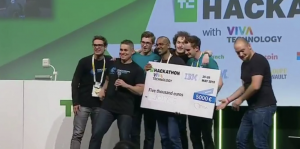
Hackathons are a great way to break the daily structure and work together on disruptive challenges. Nothing is impossible! We see that healthcare has big problems, especially with reference to mental health and caregivers. We cannot continue as we did in the past, and processes must change. Otherwise it will be impossible to give everybody good healthcare. In light of these big challenges, a hackathon can help to work with many stakeholders simultaneously, bringing them together to come-up with solutions and take the first step in the right direction.
Can you tell us about your experience as part of the Vision Health Pioneers Incubator as well as any key learnings you’ve had to date?
Vision Health Pioneers (VHP) is a program in Berlin that helps healthcare startups to launch their business in Germany. The program is divided in the three phases:
1 – Validate & fine-tune the concept
2 – Develop product version and plan launch
3 – Think and talk business
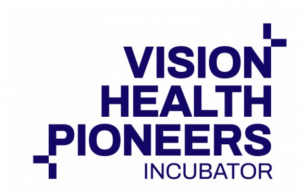
Our experience with this program was amazing and it helped us a lot! When you are accepted in VHP, you will get funding, workshops, access to more than 60 mentors, team coaching and much more. Before VHP, our goals were to focus on the Netherlands and to expand as quickly as possible into Germany. We know that Germany is a big country where the healthcare system is different, but there are many possibilities especially now with DiGA. We knew we could expand into Germany, but the question was how do we start? This is exactly where VHP has helped us step by step.
Thanks to our varied program mentors, we’ve managed to create a good value proposition, started our regulation certification process, and a nice collaboration with Universitätsklinikum Jena and Erlangen and FAU for a medical device trial next year. VHP is kind of like a family, where they always help you, it’s amazing!
What advice would you give to hackathon attendees wanting to develop their own health startup?
Never give up! It’s a long process but if you believe in it, it’s worth it. Some other advice is to find a good team with different experience and to be sure to include all stakeholders as soon as possible when creating the product.
What are the next steps for you in growing Wavy now?
Our next steps in growing Wavy include starting trials with 250 INOCA patients, expanding our team with two new employees, starting the Angina Pectoris Medical Device Trial in Germany with Universitätsklinikum Jena and Erlangen and FAU, getting ISO and CE certifications, as well as applying to DiGA Fast Track.
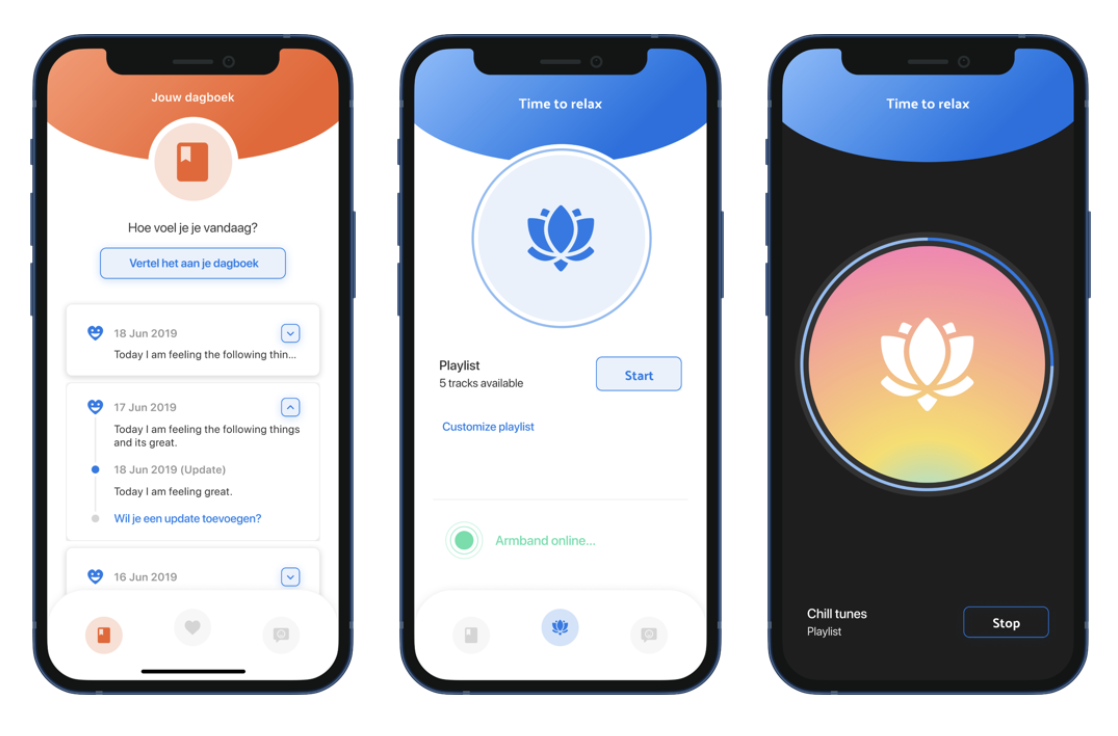
In your opinion, how beneficial has DiGA been for Germany? And should this model be applied to other countries?
DiGA is a very innovative model, and Germany is taking a step in the right direction. Germany is the first country in the world with a national model, ensuring all insurance companies will reimburse healthcare apps. We know that we need healthcare innovation, but at this moment, if we look for example to the Netherlands, it’s too complex and the process is too long.
Negotiating with each insurance company separately takes a lot of time, and in Germany they have solved this issue by introducing DiGA. When your medical device trial shows benefits for a specific patient group and you have the CE classification, it’s possible to apply for DiGA. There are two possibilities, the regular DiGA process and the DiGA Fast-Track.
With the regular DiGA process, you have already completed the whole evidence process, normally an RCT study. With the DiGA Fast Track process, you will get one year to do your RCT study and show the evidence. The great part of the DiGA Fast Track is that startups already get revenue, so this makes it possible for them to pay for the RCT study. The problem for healthcare startups is the extremely expensive process, resulting from the certifications and trials. New innovations, like DiGA, are needed to help healthcare startups move in the right direction and bring innovation to the public.
How is Wavy embracing patient-centricity?
At Wavy we have two important goals:
- Create a positive impact on people’s lives and increase their quality of life and lower their discomfort.
- Close the gender gap in cardiovascular disease. CVD is the number one killer for women and Wavy is a first step in empowering women with heart problems to take control of their health.
We work with leaders in the field like Prof. Dr. Angela Maas (MD, PhD, FESC): Professor of Cardiology for Women at Radboud University Medical Center, most influential woman in the Netherlands 2020 and UN Women’s Representative 2020/21. Currently, we’re also doing clinical trials with the same cardiologists who are writing the guidelines on CVD treatment, for example the Dutch and European guidelines for INOCA. In addition, we organize focus groups and interviews every month to understand the problems that our target audience has and to improve the app.
Can you share about the uniqueness of your UI?
Wavy focuses on stress monitoring and stress reduction. Most of the solutions in CVD focus on exercise and nutrition. Stress is now one of the five most important factors in treating CVD according to CVD guidelines. But the problem is that they do not fill in the “How”. Wavy is the first solution to market that answers the “How”. Together with cardiologists and patients, we create the best experience for the user. The uniqueness of Wavy is that it totally focuses on stress monitoring and stress reduction.
What are the journeys of the patient and caretaker (from the UX point of view)? How does this compare to your competitors?
People with chest pain have many complaints when their stress levels increase, and some subgroups like INOCA patients experience chest pain two times a week on average. The problem is that to better understand the effects of stress, they simulated stressful situations at the clinic under cardiologists’ guidance, which does not reflect real-life conditions. Another problem is that it doesn’t give a long-term overview, just a glimpse in that moment.
During the cardiac rehabilitation programs, they use meditation programs, which takes time and does not give a good overview of the symptoms. Wavy uses implicit learning. This means that stress is lowered by retraining subconscious behavioral patterns, rather than explicit learning. The app combines the quantitative data from smart wearables, with qualitative data from smart voice assistants, to form a personalized health profile for every heart patient. Wavy is able to monitor the patient’s behavior throughout the day, giving patients deeper insights into their health, which they can share with their cardiologist.
In your opinion what is the difference between the American and some of the EU healthcare ecosystems? How can Wavy benefit from those differences?
Both ecosystems are strict, because of the regulations which is understandable. A big difference is the investment ecosystem. In the United States, investors are more open to bigger investments than Europe. In Europe, investors want to avoid risk as much as possible, and they usually only invest if you already have evidence that your product is a success and all the certifications. This is a big problem because the investment is needed to get the CE and ISO certifications ready. In the United States, they are willing to take more risk, which is something that we can learn from.
Why did you choose Berlin?
The healthcare ecosystem in Berlin is huge and the city is ranked number one for MedTech. Also, many pharmaceutical manufacturers and large university clinics are based in Berlin, including the Charité, the Max Delbrück Center for Molecular Medicine and the Deutsches Herzzentrum Berlin. Another benefit is the city itself. The city has many cultures, beautiful museums, many parks and forests, and great restaurants. It’s the perfect city for a healthcare startup and staying healthy!
Learn more about Wavy by visiting their website: https://www.wavyhealth.com/
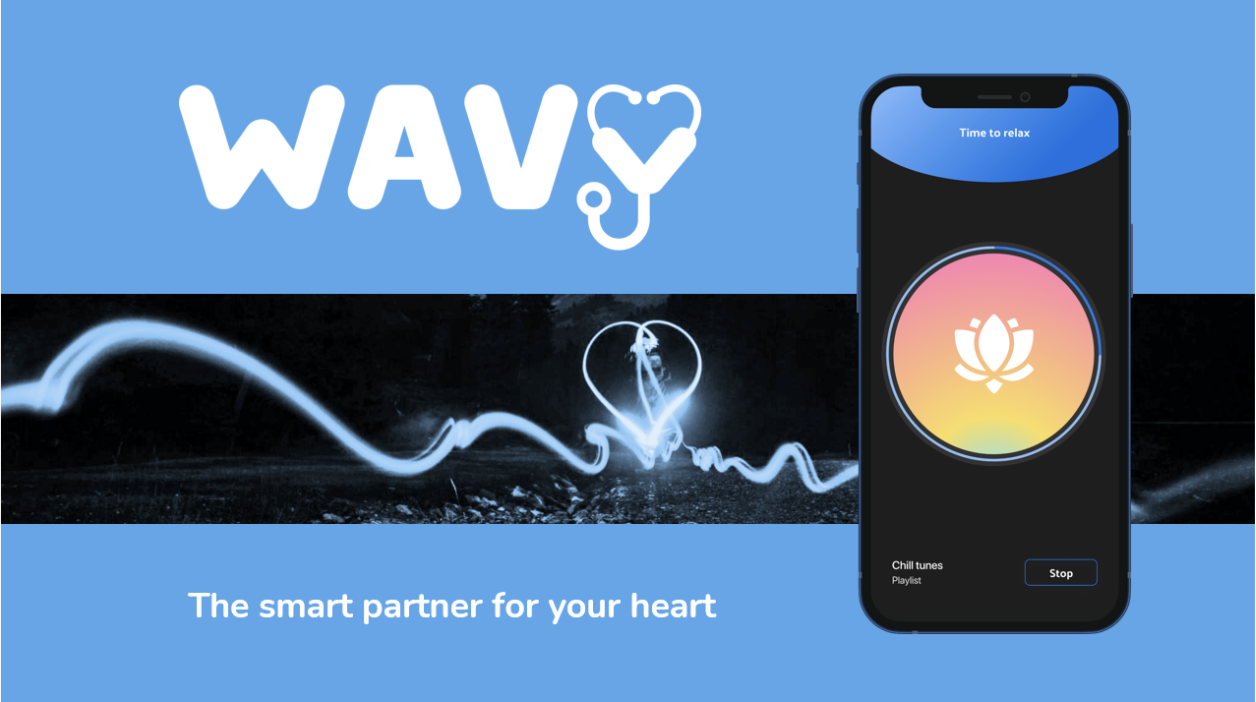
***
> Back to Hacking Health Berlin
 by Alexandra Verzuh
by Alexandra Verzuh
Alexandra is a strong marcoms professional with a global focus and over ten years of international experience in communications, writing and marketing; widely travelled with a passion for healthcare, health tech, digital innovation and technology. She is also a Certified Transformational Coach with a BA in Psychology and an MSc in International Business Management.

